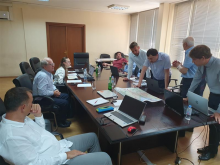Cybersecurity Response and Resilience
Cyber Incident Response Training for Energy Operators and Supporting Agencies
In June and July 2023, six critical infrastructure operators in Albania participated in a USAID-funded training program to develop vital skills and procedures to contain cyber-attacks, respond appropriately, and safely restore impacted systems. The training reinforced classroom learning by challenging participants to use their new skills to protect a simulated organization in a virtual lab. Participants gained actionable response skills to apply at their organizations and took home templated procedures and checklists to build essential and customized incident response processes with their teams.
Cyber Resiliency Challenge
This cybersecurity incident preparedness activity takes participants through the process of dealing with a simulated incident. During the simulation, tabletop facilitators introduce “injects,” or situations based on real-world experience, to observe the organization’s simulated actions and decisions in response. In 2022 USEA hosted two of these challenges.
Resource Adequacy Assessments
North Macedonia Resource Adequacy Assessment
A USEA resource adequacy assessment has determined that North Macedonia has a reliable electricity supply through 2030, in light of massive changes happening in the country: widespread retirements of fossil generation, increases in intermittent renewables, and cross-border market integration. Given its geographic position, interconnectivity with neighbors, and existing and planned generation, North Macedonia would only fall short in electricity supply if imports were ever severely limited. The USEA assessment recommended that the country consider its import levels carefully.
Montenegro Resource Adequacy Assessment
A similar resource adequacy assessment conducted for Montenegro determined that the country has sufficient electricity supply through 2030, in light of massive energy changes happening in the country and around the region. Even in a projected scenario of extreme decarbonization across Southeast Europe, Montenegro would have reliable electricity supply due to its high import capabilities and high reserves. However, the USEA assessment warns that other countries in the region would suffer from reliability issues under certain scenarios. The assessment recommends additional country-specific and region-wide resource adequacy studies.
Georgia Natural Gas Demand Forecast through 2050
The USEA JSET program has led Georgian energy sector organizations through a process to develop a model for forecasting natural gas demand. Georgia’s natural gas demand grew rapidly over the past five years. If the growth in demand continues apace, its gas transmission network may be unable to deliver winter peak supply. JSET developed an advanced gas forecasting model that will be used by the country’s energy leaders to inform the construction of additional natural gas infrastructure and to execute new gas purchase agreements to avoid increasing its dependence on Russian natural gas suppliers.
News Article: USEA convenes leaders from Georgian energy industry, government to adopt projections for natural gas demand
Related Program
Related Publications
-
September 2022 - Program Publications
-
September 2022 - Program Publications




